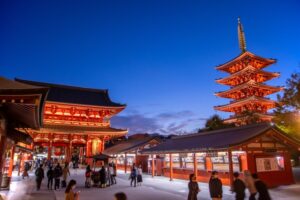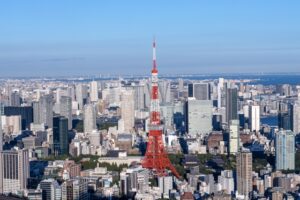Introduction:
Tokyo, Japan’s vibrant capital, is a city where ancient traditions coexist with cutting-edge technology and modern urban life. As Japan’s largest city, Tokyo is home to historical sites, traditional festivals, and the latest in technological advancements. Visitors can experience the best of both worlds—past and future—making Tokyo a must-see for those interested in exploring Japan’s diversity.
Tokyo’s Traditional Sights:

Despite its modern exterior, Tokyo is home to many traditional cultural landmarks. Senso-ji Temple, located in Asakusa, is Tokyo’s oldest and most famous temple. The approach to the temple is lined with Nakamise Street, a bustling shopping street offering a variety of traditional souvenirs, snacks, and local crafts. Senso-ji Temple itself is a place of deep spiritual significance, and it offers visitors a glimpse into Japan’s religious and cultural practices.
The Meiji Shrine, located near Harajuku, is another important cultural site. Dedicated to Emperor Meiji, who played a key role in Japan’s modernization, this Shinto shrine is a tranquil oasis amidst the hustle and bustle of the city. Visitors can take part in traditional Shinto rituals, such as making offerings and receiving blessings, making the experience both peaceful and enlightening.
Tokyo’s Modern Innovations:

Tokyo’s skyline is dominated by towering skyscrapers, neon signs, and cutting-edge architecture. The city is a hub of innovation, particularly in areas like Shibuya, Shinjuku, and Odaiba. The Shibuya Crossing, one of the busiest pedestrian crossings in the world, is a symbol of Tokyo’s vibrant energy and modernity. The crossing is a fascinating sight to witness, with waves of people moving in every direction.
For tech enthusiasts, Akihabara is a must-visit district. Known as the center of Japan’s electronics, gaming, and anime culture, Akihabara offers an immersive experience in Japan’s latest technology. The area is home to countless stores selling everything from the latest gadgets to rare collectibles.
Tokyo is also known for its innovative transportation system, including the Shinkansen (bullet train), which connects the city to other parts of Japan at remarkable speeds. The Shinkansen is not only a marvel of engineering but also a symbol of Japan’s precision and efficiency.
Tokyo’s Traditional Festivals:

While Tokyo is a modern city, its festivals offer visitors a chance to experience Japan’s traditional culture. One of the most famous is the Sanja Matsuri, held annually in Asakusa. This lively festival celebrates the spiritual traditions of the area with parades, portable shrines, and traditional music. During the summer months, visitors can also enjoy bon odori dances, which are performed to honor the spirits of ancestors.
Another important cultural experience is sumo, Japan’s national sport. Watching a sumo match is an unforgettable way to experience Japan’s rich cultural history. The matches take place at Ryogoku Kokugikan, Tokyo’s sumo hall, where you can witness the ancient rituals and traditions that accompany each match.
Tokyo’s Culinary Scene:

Tokyo’s food scene is as diverse as the city itself. From high-end sushi restaurants to casual ramen shops, Tokyo offers some of the best food in the world. Tokyo is home to the famous Tsukiji Outer Market, where you can enjoy fresh sushi, sashimi, and grilled seafood.
Tokyo is also famous for its tempura, udon noodles, and street food such as takoyaki (octopus balls) and taiyaki (fish-shaped pastries filled with sweet red bean paste). These culinary delights reflect the diversity of Tokyo’s food culture, blending both traditional flavors and modern interpretations.
Conclusion:

Tokyo offers a captivating mix of tradition and innovation. Visitors can explore ancient temples, attend traditional festivals, and experience the cutting-edge advancements that define the city. Whether you’re looking to dive into Japan’s rich cultural heritage or marvel at its modern wonders, Tokyo is a city that has something for everyone.
